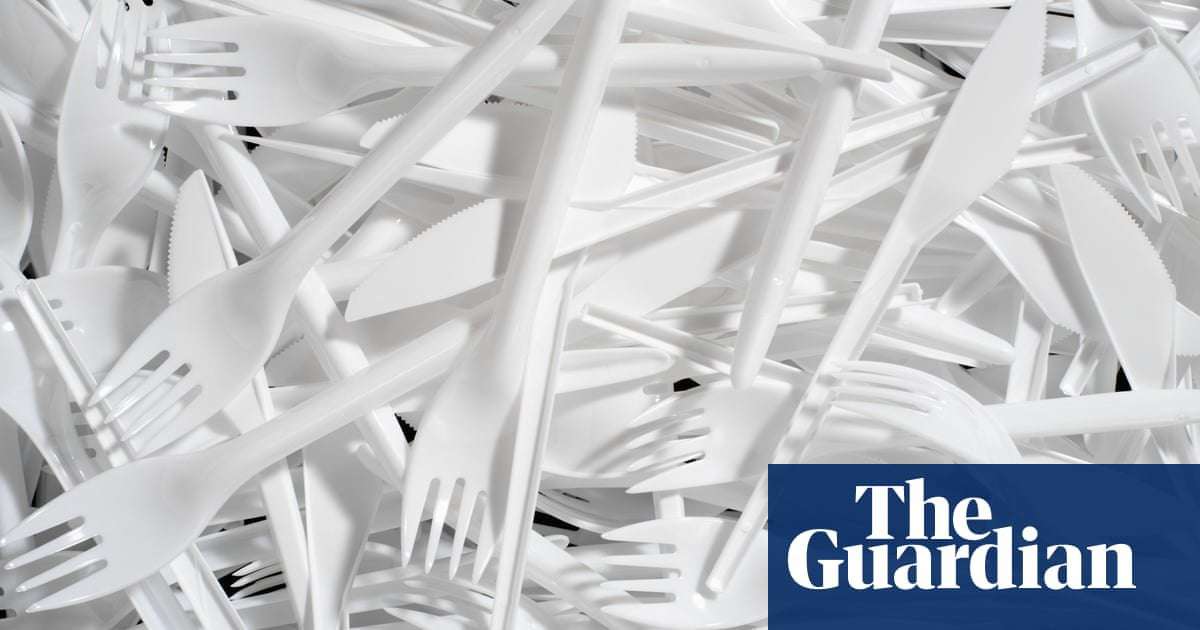Plastic cutlery and straws are among the types of single-use plastics to be phased out in Australia from 2025 under a plan to reduce plastic waste.
A national meeting of environment ministers on Thursday confirmed the phase-out would cover eight types of “problematic and unnecessary” plastic waste: lightweight plastic bags; plastic misleadingly labelled “degradable”; plastic utensils and stirrers; plastic straws; polystyrene food containers; polystyrene consumer goods packaging; and microbeads in personal care products.
The Australian government previously announced plans to phase out “single-use plastics” by the end of 2025, including banning the use of expanded polystyrene food containers by December 2022. But now federal, state and territory leaders have agreed on what that term will cover.
Conservationists have warned, however, the ambition will not be met unless the voluntary industry targets are backed up by tough regulation.
Queensland has passed laws to ban plastic straws, cutlery, plates, stirrers, and polystyrene food containers, with the legislation to take effect from September.
Thursday marked the first national environment ministers meeting since November 2019. A joint communique released on Thursday night said the ministers also agreed in principle to support a rollout of food organics and garden organics waste collection services, and to a “harmonisation of municipal waste collection” including new standards for kerbside waste collection.
Australia produces 2.5m tonnes of plastic waste each year, about 84% of which is sent to landfill. About 130,000 tonnes of plastic waste leaks into the environment annually.
Darren Kindleysides from the Australian Marine Conservation Society said national agreement on the types of single-use plastics covered by the ban would give businesses certainty and ease consumer confusion.
“This is welcome progress on these killer plastics and will help to ease the pressure on our marine wildlife,” he said. “We would urge our governments to take the further step of implementing national mandatory bans to ensure the good progress in some jurisdictions continues.”
According to the communique, the ministers also discussed “the vital role cooperation will play in building a more climate-resilient Australia” and a federal government promise to engage with state and territory governments in the lead-up to the Cop26 Glasgow climate change conference. It did not mention any specific strategies for emission reduction.
The ministers also agreed to support the national koala monitoring program.
Suzanne Milthorpe, the national environment laws campaigner for the Wilderness Society, had hoped for more action in response to the findings of the royal commission into national natural disaster arrangements and the review of Australia’s federal environment laws, both of which were handed to the government in 2020.
“There is a lot of ‘noting’ and ‘discussing’ but not a lot of acting, especially on behalf of the commonwealth,” she said.
Milthorpe criticised the federal government for failing to provide a formal response to the review of Australia’s environmental laws by Prof Graeme Samuel, who called for a major overhaul of the regulatory system.
“What is clear from the Samuel Review is that state and commonwealth governments must work together to raise the standard of environmental protection in Australia,” she said. “There is a reality gap between the current discussions and what is required to ensure icons like the koala and the Great Australian Bight have a future.”
The Samuel review made 38 recommendations to change the Environment Protection and Biodiversity Conservation Act including the immediate introduction of legally-binding national standards. A draft of the proposed standards was included in the review.
The Morrison government instead drafted its own version of the interim standards, which were described by Senate crossbenchers as “substantially weaker” than those recommended by Samuel.
The communique said state and territory ministers “noted the national cabinet priority to introduce national environmental standards reflecting the current requirements of the EPBC Act”.
It said the ministers “noted the commonwealth’s commitment to subsequent phases of reform” and its “undertaking to provide a timeline for subsequent phases of reform”.
Basha Stasak from the Australian Conservation Foundation said she would welcome seeing that timeline – given the urgency of the Samuel review.
“The government’s proposed interim national standards are incredibly vague and weak and they really need to be disposed of,” Stasak said. “Any consultation that’s going to take place with the states and territories needs to be starting from scratch and based off the draft interim standards in Prof Samuels’ report.”

TooMuchTaurine on April 17th, 2021 at 09:44 UTC »
Haha, just like they "phased out" single user plastic bags already?? And now i just get given thicker disposable plastic bags with "reuse/recycle" written on then.
What a fucking joke...
Worth watching this 9 minute clip to see how fucked the whole situation with plastics is ..
https://youtu.be/PJnJ8mK3Q3g
AlphaBarbarian on April 17th, 2021 at 09:29 UTC »
How about plastic fishing equipment like nets ?
inspired_apathy on April 17th, 2021 at 07:23 UTC »
How about factory/industrial single use plastics? These are the primary contributors of environmental pollution. Disposable cups and utensils make up a smaller percentage compared to industrial packaging like blister packs, shrink wraps, the plastic bags used for chips and candy packaging, the polystyrene plates used for meat packing, etc.